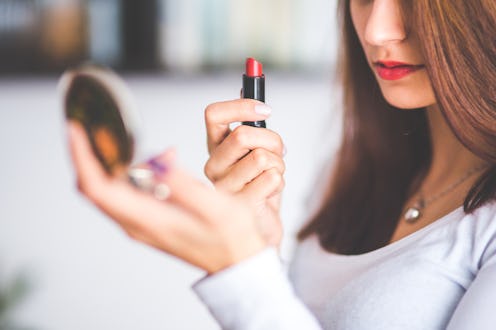Life
Why Men Think Women Wear Makeup

Today in UGGGH. A new poll from the website YouGov.com finds that 63 percent of men think women wear makeup to trick people into thinking they’re attractive. In other news: I give up.
Men aren’t alone. According to the poll, 55 percent of U.S. adults, regardless of gender, feel women wear makeup to trick people into thinking they’re more attractive, and 43 percent feel women wear too much make up. And while 53 percent of women "strongly agree" that the media holds them to unrealistic beauty standards, only 30 percent of men feel the same way.
Now excuse me for a moment while I go scream “Please just leave us alone!” into a throw pillow until I pass out.
These numbers are proof of how pervasive makeup-shaming is — deriding someone for how or why they choose to wear makeup. Like its close friends body-shaming and slut-shaming, makeup-shaming holds women to an unrealistic standard, and then punishes them for either failing to meet this standard, or for having the audacity to meet it. If you don't wear makeup, you're a slob, and if you do, you're thirsty, desperate.
And like body-shaming and slut-shaming, makeup-shaming has a serious economic impact on women. The cosmetics industry makes $60 billion each year, and the personal finance website Mint.com estimates the average woman will spend $15,000 on makeup in her lifetime. $15,000! You could buy a middle-of-the-line jet ski with that, or diamond contact lenses. And if a woman doesn’t choose to wear makeup? That’ll cost her too. One study found participants were more likely to award “prestigious jobs” to women who wore makeup, and another found that male patrons tip more when female waitresses wear makeup (the same was not true for female patrons).
While it’s difficult to pick which single ingredient stinks the most in this elaborate turd salad, perhaps the most upsetting is the language itself. The idea that women can “trick people into thinking they’re attractive” — like we’re all malicious sex witches hell-bent on global domination through pants-tenting, instead of human beings trying our best to get through the day -- not only reinforces the concept that a woman’s main job is to attractive, but that women are the ones ultimately responsible for how other peopl`e perceive and consume them. It’s the same mentality that punishes little girls for wearing clothes deemed too “seductive”, instead of punishing the men who sexualize them, the same mentality that blames sexual assault on a victim’s clothes instead of blaming it on the perpetrator.
When I first saw these numbers, I was furious. What poor, stupid soul was being “tricked” by makeup? What dummy watched a woman wash off her glitter eyeshadow and shrieked that they had been duped? Then I thought about my own attitude to makeup, the anxiety I feel when a someone I like first sees me without mascara, how frustrated I feel about my short, pale lashes and blotchy skin, like they’re some horrible secret instead of regular parts of a human body. But we never see short, pale lashes and blotchy skin on TV or in magazines, unless it’s some sort of poorly-lit “before” picture. I realized that a lot of the time I’m not wearing makeup to celebrate my body, I’m wearing to hide my body. Women aren’t tricking people with our makeup — but in some cases, we’re the ones who have been tricked.
We’ve been tricked into believing that makeup is something we owe others, instead of something with which we can delight ourselves; tricked into believing there’s anything natural about the “natural” look; tricked into believing makeup is for women and not for men (I firmly believe eyeliner can make any human's eye 16 percent more awesome, no exceptions).
Makeup is wonderful and colorful and magical. It's a way for people to play and explore, to express their creativity, highlight their own unique beauty, and announce to the world what kind of person they want to be today. Makeup is a privilege and a celebration. Let's start treating it that way.